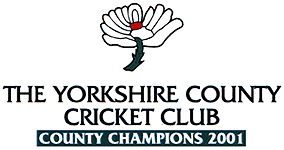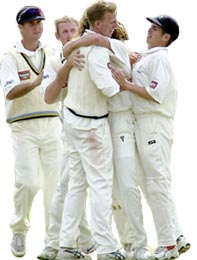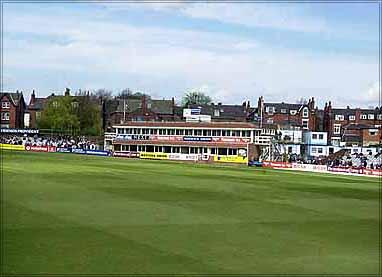Yorksview
Yorkshire Win County Championship

Friday 24 August 2001
6.30am It is raining in Glossop, Derbyshire. A huge belt of rain, mist and low cloud is moving slowly, but inexorably, from the south-west to the north-east of England.
Scarborough is a seaside town on the north-east Yorkshire coast.
9.30am It is now raining in Leeds.
10.30am It is raining in York but not yet in Scarborough.
10.55am Scarborough Cricket Club, North Marine Drive, Scarborough. David Byas, captain of Yorkshire County Cricket Club, leads out his men on the last day of a four-day cricket match against Glamorgan. Yorkshire need to take the last four Glamorgan wickets to win the match outright. They need to do this before the rain arrives or the match will be drawn. Yorkshire need to win.
The sky is heavy, dark and overcast. It is raining in Beverley.
12.10pm The last Glamorgan batsman, appropriately named Jones, walks to the wicket. A few drops of rain are felt by a huge, anxious crowd.
12.13pm Jones tries to hit the ball out of the ground. He hits it high enough, but not far enough. The ball drops into the safe hands of David Byas. The game is over. Yorkshire have won by an innings and 112 runs.
|
Joyous pandemonium breaks out at Scarborough cricket ground as the rain pours down. Grown men weep and throw small boys in the air. Policewomen look on in amazement. Why all the fuss over a cricket match? Why? Because the win means that Yorkshire have won cricketís County Championship for the first time since 1968. The championship has come home at last. God, a Yorkshireman, is back in his Heaven. All is right with the world.
Why is cricket so important in Yorkshire; after all, itís only a game, played all over the world?
|
Yorkshire players celebrate! |
Cricket is so very important to Yorkshire because, in many ways, cricket defines Yorkshire. In the grim years between the Great Depression and the Second World War cricket enjoyed immense popularity in much the same way as soccer dominates today. Cricket has been played in England since the Middle Ages, on village green and city back alleys, but in the twenties and thirties it grew in national popularity, fuelled by increased literacy and affordable radio which kept the population in touch with events on the larger stages.
During those years Yorkshire dominated cricket, winning the championship twenty nine times in forty years. The litany of famous names rolls down the years: George Herbert Hirst; Wilfred Rhodes; Herbert Sutcliffe; Hedley Verity; Leonard Hutton; Brian Close; Freddie Trueman; Geoffrey Boycott. All these men, and many more, were heroes for Yorkshire and for England. The only two England captains ever to win back the Ashes in Australia, Hutton and Illingworth, were both Yorkshiremen. In fact, they both came from the same village, Pudsey.
Naturally Yorkshiremen were proud of their cricket and proud to be associated with its success, but this alone didnít give Yorkshiremen our innate sense of superiority and arrogance. No. What defines Yorkshiremen is a unique birthright, enshrined in the first rule of Yorkshire County Cricket Club. Only Yorkshiremen could play cricket for Yorkshire. Unless you were born within the Broad Acres, regardless of parentage, title, wealth, colour, race or creed, you could not be selected to play cricket for Yorkshire. This bestowed a sense of nationhood in Yorkshire.
Other, social and demographic factors were at work in those years. All the factories, mills, coal mines and steel works were in the grim, dirty North. The village greens and the thatched cottages were in the soft South. The brass was earned in the North but spent in the South.
|
|
There was also the English
class system: amateurs and professionals, players and gentlemen;
separate changing rooms; the professionals had to call the amateurs
ĎSirí whilst they were always called by their surname. The captain was
always an amateur, usually ex-public school, often minor aristocracy.
Leonard Hutton (later Sir Leonard) was the first professional to captain
England and that didnít happen until 1952. Yorkshire always had ten
professionals and one amateur, the captain.
Headingley |
The attitudes were very different. The amateur, a gentlemen sportsman, wore immaculate whites, cravat, gaily coloured public school cap. The Yorkshire professional, iron-booted, granite chinned, dressed in dingy whites and a single navy blue cap with an eleven-petaled white rose for a badge. An image Yorkshiremen adopted as their own; call a spade a bloody shovel!
Both sides of this social divide were slightly contemptuous of the other. The amateurs, who ruled the game (and the country), felt that a paid sportsman was a contradiction in terms. The Yorkshire professionals regarded the southern gentlemen as effete fops, flannelled fools who only played at the game.
This is best illustrated by an incident which may have occurred in a game between Yorkshire and Surrey in 1936. The Yorkshire fast bowler, Emmott Robinson, took the wicket of the Surrey captain, The Right Honourable Smythe-Foulkes, with an absolute beauty. The ball swung, dipped and seamed before taking out the middle stump. Unplayable. Smythe-Foulkes stopped to speak to Emmott Robinson on his way back to the pavilion:
'Well bowled, Robinson,' said Smyth-Foulkes sportingly, 'a wonderful delivery.'
'Aye' replied Emmott, graciously, 'it were bloody wasted on thee.'
Yorkshire last won the championship in 1968 but we Yorkshiremen have continued with our hard-faced, no-nonsense, unjustified arrogance, inherited from our cricket teams, ever since. Anachronistic chauvinists in a pansy, PC world, but now the championship has come home, after thirty three years. If we were difficult on Thursday, weíll be bloody impossible now!
Friday 24 August 2001
A great day to be a Yorkshireman and a great day to be a brewer. There was some ale supped in Yorkshire that night.
![]()
Tetley's - a Yorkshire Brewery
John Rigg
Rawdon
August 2001
John Rigg (email)

